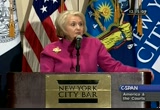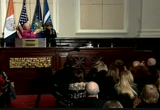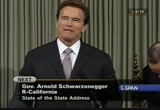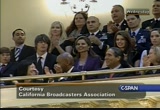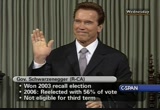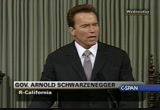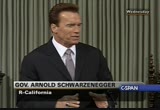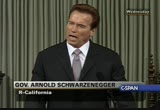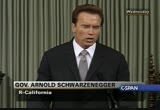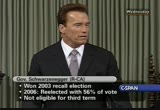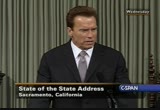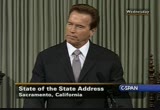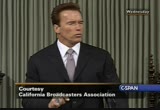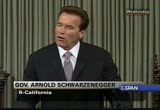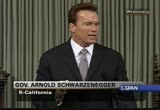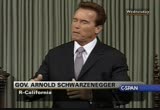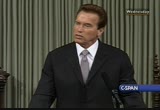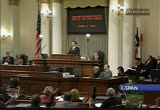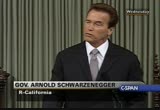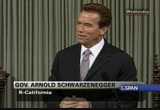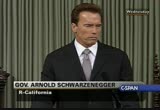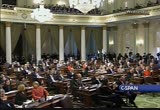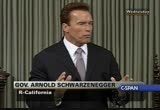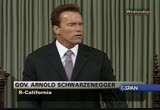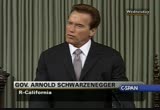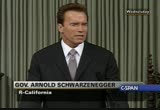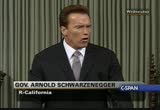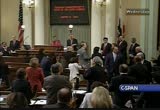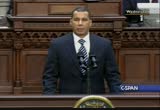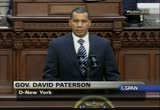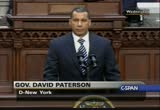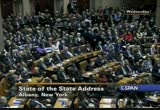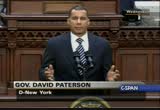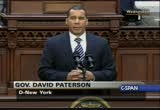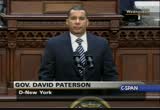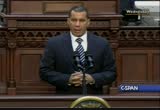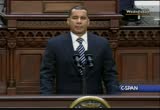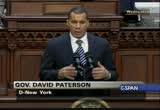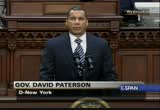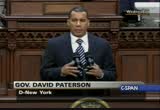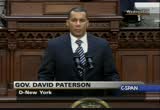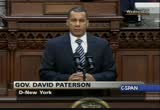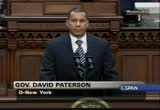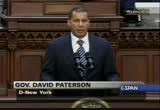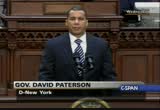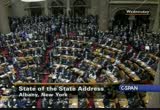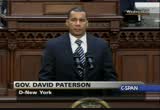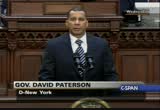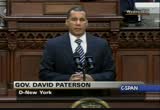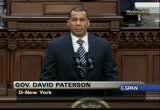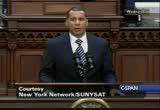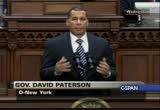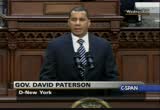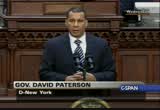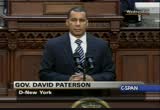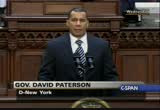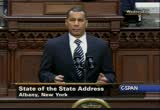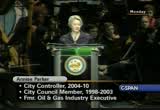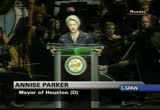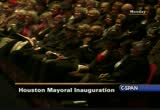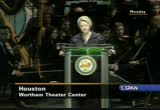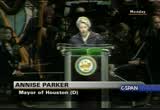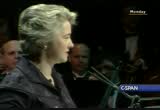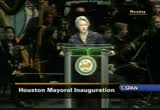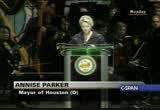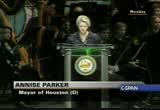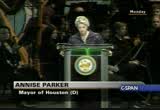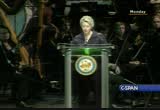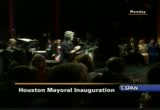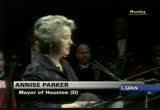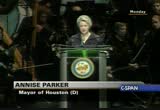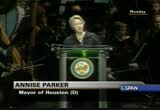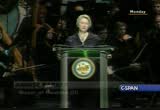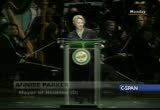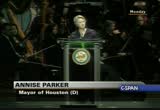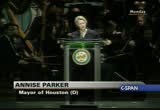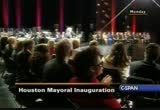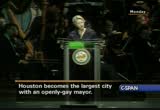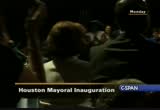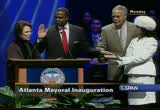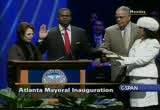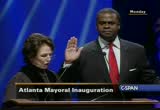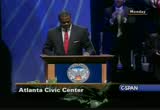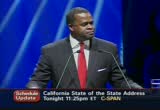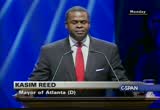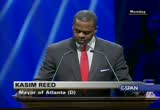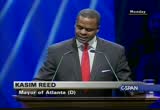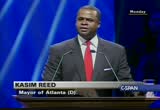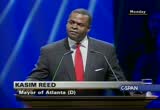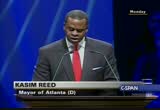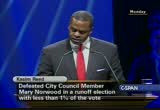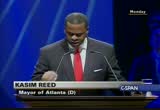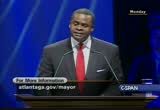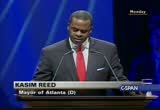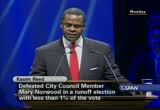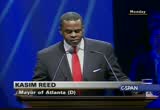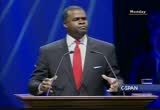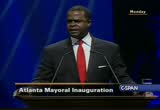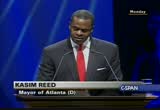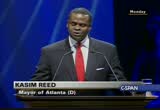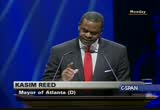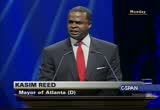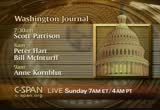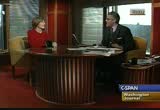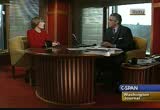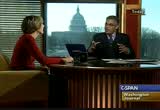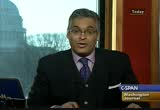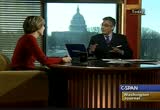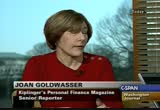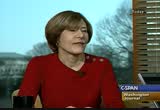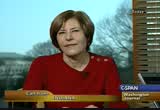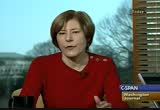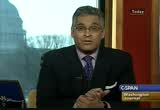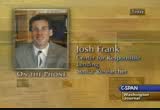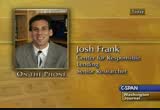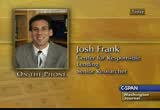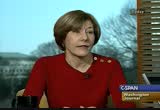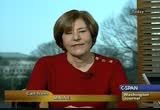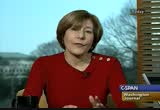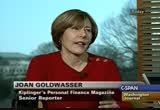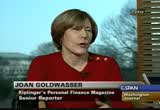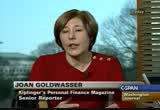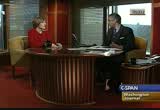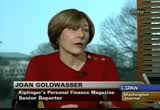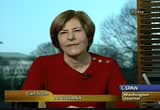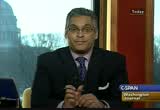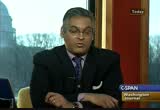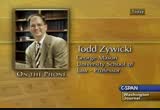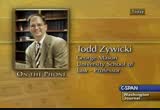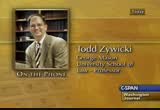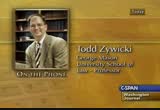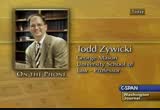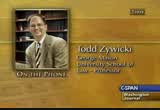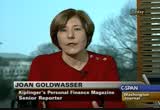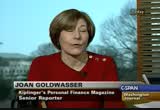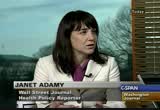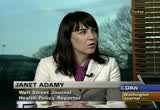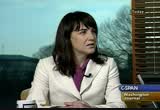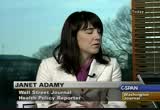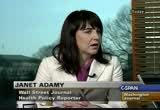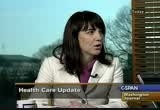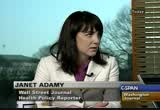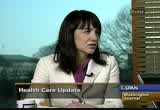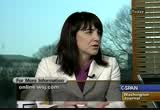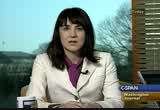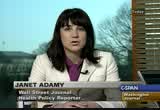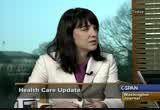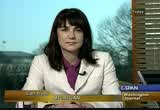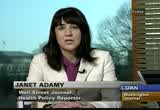tv American Perspectives CSPAN January 9, 2010 8:00pm-11:00pm EST
8:00 pm
doing better. and thank god for people like justice ginsburg, because the situation for women in so many ways would be even worse. where the laws have really made a difference here. but when it comes to some of the great social challenges, we have more than our share. you just described some of them. many of our cities in rural areas are coping with these problems, and they are obviously issues that we need to address, the administration is working to address. but we have a way to go. and all of us need to do what we can. >> this is actually the perfect closing question, because many of us in this room stand committed to do a great deal at home and around the world. i think this is inspirational. thank you so much. >> this discussion took place at the new york city bar association in new york city.
8:01 pm
8:02 pm
eligible to run for office again. from sacramento, this is about half an hour. [applause] >> thank you. thank you very much. thank you. thank you. thank you very much. thank you, said that pro tem, speaker, attorney-general brown, treasurer, secretary of state, controller, the insurance commissioner, superintendent of public instruction, members of the board of equalization, all of my cabinet secretaries, my chief of staff, members of the legislature. it is good to see everyone here together again. just introduce a few guest i have in the gallery first of all my wife maria shriver my
8:03 pm
8:04 pm
of the california naacp, [applause] speaker hertzberg, right over here. [applause] also hone assie community college chancellor jack scott, big hand to him also. and then we have a very, very special guest here sara granda, who overcame great obstacles to pass her bar exam and become an attorney. let's give her a special, big, big hand for the great work that she has been
8:05 pm
doing. [applause] i want to begin with a true story from which we can draw a worthwhile lesson. as you might guess, the schwarzenegger household is something of a menagerie: an austrian bodybuilder, a tv journalist, four children, a dog, the normal goldfish and hamsters and so forth. and in recent years we added a miniature pony and a pot-bellied pig. it's not unusual for me to look up from working on the budget or something to find a pig and a pony >> standing right there in front of me and staring me. now, the dog's food, which we keep in a canister with a screw-on lid, sits on the top of the dog's kennel. the pony has learned to knock the canister off
8:06 pm
the top of the kennel, and then he and the pig wedge it into the corner. there's this ridge on the lid of the canister, and the pig with his snout pushes this ridge around and around until it loosens. and then they roll the canister around on the floor until the food spills out. and then of course they go to town and they eat it. i don't know how they ever figured all of that out. to tell you the truth. it's like humans figuring out how to create fire. but it is the greatest example of teamwork. i love it. it's about team work. so one lesson to draw from the pig and the pony story is what we can accomplish when we work together. and last year we here in this room did some great great work together. we had a pig and pony year. and i want to make sure now before some reporters write that i compared the legislator to pigs and ponies that that is not the
8:07 pm
message. the message is about working together. team work. together as a team as fracture rouse and tentative and as uncertain as it might have been. together, we got california through the front end of the worst financial crisis since the great depression. although not without pain, we closed a budget gap of $60 billion. plus. these decisions were very hard for both sides of the aisle. on the republican side, we had leaders who sacrificed their careers or put them at risk. on the democratic side, we had legislators who were threatened by their own interest groups. to those on both sides of the aisle who took these risks for the good of the state, you have my deepest admiration. we did what we had to do. we made painful spending cuts. we passed temporary tax increases. we permanently eliminated colas for most state programs. we made major reforms in welfare and parole. and there are two accomplishments
8:08 pm
in particular i want to recognize. just last night the assembly passed major educational reform, reform that once seemed impossible, but now will become law as soon as it hits my desk. for too many years, too many children were trapped in low-performing schools. the exit doors may as well have been chained. now, for the first time, parents -- without the principal's permission -- have the right to free their children from these destructive schools. that is a great freedom. also in the past, parents had no power to bring about change in their children's schools. but that will now change. parents will now have the means to get rid of incompetent principals and take other necessary steps to improve their children's education. to increase accountability, we broke down the firewall so that teacher performance can be linked to student performance. [applause]
8:09 pm
>> so that's a great, great accomplishment and congratulations to all who did this great work. another major accomplishment: for decades this state was in a literal war over water, with old and deep divisions û northern california versus southern california, democrat versus republican, farmer versus environmentalist, business versus labor. and the list goes on and on. we here in this room made history with the most comprehensive water package in nearly half a century. we brought all stakeholders together. by workinging to we got it done. and now we must work to pass the $11 billion in water bonds that will be on the ballot in november. democrats and republicans will have to travel up and down the state to educate the people of california why those bonds are so important. because some people say how can we afford those bonds in the current economic climate?
8:10 pm
i say, how can we not? it is the law that you cannot build a school, you cannot build a factory, you cannot build an office building or a housing development without identifying a source of water. as a result, huge projects with thousands of jobs have been put on hold. our economy cannot grow without water. our population cannot live without water. it is our state's lifeblood. now is exactly the time to invest in it, so that when californians turn on the faucet, there is safe, reliable and clean water coming out the tap -- not just five years from now but 30, 40 or 50 years. from now. that is so important. now let's talk about the coming year. if i had to summarize in one word our focus for the coming year, it would be the word "priorities." we have to get them straight and we have to keep them straight. the first priority for the coming year is
8:11 pm
to get the economy and get jobs back. jobs, jobs, jobs. [applause] the people and businesses of california are an engine of self-betterment and progress. as long as government keeps the engine oiled with prudent policies, and, more importantly, does not pour sand in its gears, this state will persevere and prosper. i will come to the main thing we can do to help the economy in a moment, but there are four proposals to spur job growth that i will introduce. first, you will receive a $500 million jobs package that we estimate could train up to 140,000 workers and help create 100,000 jobs. second, you will receive a measure to streamline the permitting of construction projects that already have a completed environmental report.
8:12 pm
third, to stimulate other construction jobs, you will receive a proposal for homebuyer tax credits of up to $10,000 for the purchase of new or existing homes. [applause] and fourth, since we want california to be the dynamo of green technology, i ask you to pass our proposal exempting the purchase of green tech manufacturing equipment from the sales tax. that, too, means jobs -- [applause] jobs for the new economy. while we still have a long way to go, the worst is over for california's economy. and the really good thing is that we have the right economic mix going forward -- high tech, green tech, biotech, hollywood-tech, farmer-tech and so forth. our economy is well-positioned to take advantage of the future. so let me tell you the main thing that we here in this chamber can do to help the economy and jobs.
8:13 pm
we can be a better partner to the economy. because the state and government has a responsibility not to be an obstacle to success but to be a partner in prosperity. to strengthen the economy which is the foundation of all jobs, we here in this chamber must reform california's budget and tax system. that would be a huge stimulus. the basic problem is that our tax system does not reflect our economy. in 2009, california's economic growth declined only by 2.8%, but our tax revenues were down more than eight times that much. our economy is diverse, whereas our tax system is not. 144,000 taxpayers pay almost 50 percent of all personal income taxes. think about it. 38 million californians have to rely on 144,000 people for their schools,
8:14 pm
their fire protection, their health care, their public safety and many other services. that makes no sense. here is what we need to accept: our economy is 21st century, but our tax system is 20th century. it's stuck in the wrong century. the tax reform commission did its work and came up with a plan for reform that was praised by both willie brown and "the wall street journal". how often does that happen? [laughter] the commission proposed major, radical reforms. some people say they are too bold and thus they would be too hard to enact. what do they mean too bold? bold is what we do in california. what do they mean too hard? if i had hesitated in my career every time i made a move because it was hard i would still be yodeling in austria.
8:15 pm
we must begin work on the tax reforms simply because we cannot wait for the rich to bounce back. the state revenues are not expected to return to where they were until 2013, 2014. i sent you a tax reform plan. i sent it in late december. it seems to me it has somehow disappeared. where is it? maybe the pig and the pony have taken it. you know something? i am looking forward to working with the legislature to get this done. budget reform is just as important. this is something i have been talking about since i have become governor of this great state. iwe know it was coming, we have known it for years. yet sacramento would not reinforce its economic levees. in addition to taking action on the tax commission's plan, i ask you to also take action on the
8:16 pm
best practices budget accountability act, which has been drafted to move california forrward. i also support performance based budgeting and debt reduction, infrastructure, and creating a rainy day fund. the leaders of this body have said and said it many times that the legislature should be given a chance to enact reforms before reforms go directly to the people. here is that chance. i urge you to take it. and as we struggle to overcome our differences, what i ask you to remember is that the current tax and budget system is cruel. i tell you why i say that. it is cruel because it is forcing us to make a sophie's choice among our obligations. which child do we cut? the poor one? the sick one? the uneducated one? the one with special needs?
8:17 pm
that is cruel. we overcame the divisions on water. i know we can also overcome our obstacles and divisions on tax reform and the tax system and the budget system. let's do it. i will address our immediate budget situation more fully in a few days when i present my budget but let me just give you an overview. we face a $19.9 billion deficit: $6.6 billion for the rest of this budget year and $13.3 billion for the upcoming budget year. big picture, let me tell you what will be required. first, as bitter as the words are in my mouth, we face additional cuts. we know what that means. we know the pain it entails. what can we say at this point except the truth, that we have no choice. but i am drawing this line. because our future economic well-being is so dependent
8:18 pm
upon education, i will protect education funding in this budget. [applause] and we can no longer afford to cut higher education either. [applause] the priorities have become out of whack over the years. i mean, think about it. thirty years ago, 10% of the general fund went to higher education and 3% went to prisons. today almost 11% goes to prisons and only 7% goes -- only 7 and a half percent goes to higher education. spending 45% more on prisons than universities is no way to proceed into the future. [applause]
8:19 pm
what does it say about a state that focuses more on prison uniforms than caps and gowns? it simply is not healthy. i will submit to you a constitutional amendment so that never again do we spend a greater percentage of our money on prisons than on higher education. [applause] the way we get this done is to find more cost-effective ways to run our prison system and allows private prisons to compete with public prisons. competition and choice are always good. california spends $50,000 per prisoner. by comparison, the ten largest states spend $32,000. they spend less, and yet you do not see federal judges taking over their prison health care. why do we have to spend so much more than they do? if california's prisons were
8:20 pm
privately run, it would save us billions of dollars a year. that's billions of dollars that could go back to higher education where it belongs and where it better serves our future. [applause] choosing universities over prisons -- this is a historic and transforming realignment of california's priorities. if you have two states and one spends more on educating and one spends more on incarcerating, in which state's economy would you invest? i ask you to make the right choice for california. another major item is this: federal funds have to be part of our budget solution because the federal government is part of our budget problem. when president clinton was in office, california got back 94 cents on the dollar from the federal government. today we get only 78 cents back. texas gets 94 cents. pennsylvania gets $1.07.
8:21 pm
alaska, with all its oil, gets back $1.84 for every dollar. and guess what new mexico gets $2.03. this should be more fair and equitable. we are not looking for a federal bailout, just federal fairness. [applause] californians carry a special burden since we are a border state. the federal government alone controls immigration policy. it alone controls border security. while acknowledging its responsibility, the federal government is not even funding a 50-50 split of the costs of undocumented immigrants. we can no longer ignore what is owed to us, or what we are forced to spend on federal mandates. we are currently owed billions of dollars by the federal government for various programs. we need to work
8:22 pm
with the feds so that we can fix the flawed formula that demands that states spend money they do not have. now congress is about to pile billions more onto california with the new health care bill. while i enthusiastically support health care reform, it is not reform to push more costs onto states that are already struggling while other states get sweetheart deals. health care reform, which started as noble and needed legislation, has become a trough of bribes, deals and loopholes. you've heard of the bridge to nowhere. this is health care to nowhere. california's congressional delegation should either vote against this bill that is a disaster for california or get in there and fight for the same sweetheart deal senator nelson of nebraska got for the cornhusker state. [applause]
8:23 pm
because that senator got for the cornhusker state the corn and we got the husk. [laughter] now, another priority relating to the budget is pension reform. the cost for state employee pensions is up 2,000% in the last ten years, while >> -- you heard me right 2,000%. while revenues have only increased by 24%. the pension fund will not have enough money to cover this amount, so the state -- that means the taxpayer -- has to come up with the money. now we are already putting in there every year more than $3 billion for those pensions. that amount will go up to $10 billion and this is money that is taken away from important government services. this is money that cannot go to our universities, our parks and other government functions. now, for current employees these pensions cannot be changed, either legally or morally. we cannot break the promises we already made.
8:24 pm
it is a done deal. but we are about to get run over by a locomotive. we can see the light coming at us. we can see the lyings coming. -- lights coming. i ask the legislature to join me in finding the equivalent of a water deal on pensions, so that we can meet current promises and yet reduce the burden going forward. these are serious issues we face. every year, in spite of whatever challenges are before us, i stand up here and tell you how much i believe in california's future. i tell you how much i believe in the dream. how this is the greatest place in the world. some people say "ya, ya, ya, that's just arnold being optimistic." but i am not alone in believing these things. "time" magazine recently did an article about california that sounded like one of my speeches. i would like to read you a few sentences.
8:25 pm
that "time" magazine wrote. "california is still a dream state. in fact, the pioneering megastate is still the cutting edge of the american future -- economically, environmentally, demographically, culturally, and maybe politically. it is the greenest and the most diverse state, the most globalized, when the world is heading in all those directions. it's also an unparalleled engine of innovation, the mecca of high tech, biotech and now clean tech. in 2008, california's wipeout economy attracted more venture capital than the rest of the nation combined." so, now do you believe me? you see what i'm saying. this is the greatest place in the world. california has the means and the mind power to solve its problems. sometimes we are just too close to the problems to see the positives, and we need to step back. a couple months ago i was in iraq visiting our men
8:26 pm
and women in uniform, it's the second time i've been over there and it was a great experience. and of course we have so many of our californians over there serving. i had breakfast with them. we chatted we worked out. i pumped them up. took pictures with them and they told me all kinds of stories. they've seen experiences that you cannot even believe. many have served tour after tour after tour and as a result, some have lost homes, spouses, limbs and even their lives. too often our soldiers bring back the enemy with them in their heads. we are seeing and hearing all about a lot of this post-traumatic stress syndrome. the suicide rate is disturbing. this country cannot continue living in denial about those things. these men and women need help.
8:27 pm
[applause] california has more returning veterans than any other state, so our state, as well as the federal government, has a special responsibility. you will see that in our agenda. we have a fundamental obligation to anyone who has shed or risked blood for this country. that is a priority. [applause] their sacrifice is extraordinary and never fails to inspire me. and if you look to the gallery, you will see some californians wearing the uniform of our country who just came back from iraq and afghanistan so these brave men and women, i say welcome home. welcome home. [applause]
8:28 pm
no matter how big the problems are that this state faces, no matter how harsh things may seem to us in the months ahead, those californians in uniform will tell you that this is still the greatest place to come home to, the greatest place to pursue a better life. just ask them how often >> they dreamt of being back
8:29 pm
here at home in the golden state. so ladies and gentlemen, in closing we in this chamber must fulfill our sacred trust to keep california a great place to come home to, for our men and women in uniform, and for generations of californians yet to come. thank you very much. and god bless all of you. thank you. [applause] [captions copyright national cable satellite corp. 2010]
8:30 pm
>> at the same time governor schwarzenegger was delivering his address, governor david paterson spoke about the state of affairs in new york. he concentrated on campaign issues and finance reform law during this speech in albany. >> thank you. before we begin, i like to thank the speaker and all of his staff members to arrange these wonderful accommodations for ross and the cooperation of the staff of senator john samson and his cooperation as well.
8:31 pm
>> it has become customary on occasions of this significance to recognize each and every public official in the room with congratulatory pronouncements and self reflected praise. but my colleagues, at times are measures and i would ask what your understanding that we dispense with the flourishes and formalities and i would like to address all of you today just as fellow citizens of our great state, all equal under the eyes of god, all response both to the people of the state of new york, whether our service be short lived or long remembered. this is a winter of reckoning. i come before you today not just to talk of the state of the state, but also of the state of our self governance. a fragile instrument of popular will that has become the will to be popular. where it is easier to deny reality and to demand that
8:32 pm
which we cannot afford than to accept that years of living on the margins of our means have had to end. look at history. culturist of addiction to spending, power, and approval have ruined empires and now they threaten the empire state. but i come here today not to replay old grievances or in any way to reclaim lost ground. what we come here to build, to build new york's economy to a national model of ingenuity and strength, to build our people's trust in the fiscal stability of our state, to build our manufacturing to meet the energy standards of this enlightened era. and most of portly, to build the trust that the people once had in their state government.
8:33 pm
the last two budget battles have left its toll on all this in this chamber. there are more deficits up ahead that will require an even greater sacrifice. but if acceptance really is the prelude to recovery, then we have to accept that the old way of doing budget is unsustainable. so do the special interests to intimidate, who badger, and to push when they do not get their way, even when they are aware that the cupboard is bare. the time for that type of politics has to end. [applause] we have to take firm and
8:34 pm
decisive steps to rebuild n.y.. we need fiscal reform, at fixed reform, and we need economic plan that will put new yorkers back to work. [applause] and so today, i'm not just speaking of the state of the state as it is, but we are talking about what the state of the state will be. the plan i have placed before you turned this crisis into an occasion for leadership. the decision foremost in my mind every time i make one answers the question are we doing what is right for the people of the state of new york? so, in times of greater prosperity, the reforms we are proposing were ignored. prosperity hides all matters of sin, but no longer. we have to rise to the highest expectations of our people and
8:35 pm
bring them lasting change they have long, long fought for and desired. there is no hierarchy in these reforms, they are all vital. our fiscal reforms will bring real and blasting change and, by cutting our bureaucracy, by merging agencies that replicate services, public tracking of agency performance, and long- term strategy for fiscal discipline and management. [applause] i have asked our new lieutenant governor to take the lead in a four-year plan for fiscal recovery. it is the most reasonable way that we can actually bring state spending into line and
8:36 pm
government into the right side. it is also the only way to eliminate unnecessary, unfair, and unexpected mandates on local governments, hospitals, school districts and mass-transit. no longer are we going to run new york like a payday loan operation. and yet, i am renewing my call for a spending cap. [applause] now i know this will be met with a lot of resistance. but i fought 25 years to eradicate the rockefeller drug laws and i will put that same effort into seeing this become a lot even if it has to be passed by constitutional amendment.
8:37 pm
whether it is this it ministration or the next or the one after that, we have got to find a procedure that cures the spending structure that has an effect of our budget process for the last 20 years. the sooner we do that, the more control we will have a spending, not less. for as you may have observed in the past few weeks, the governor will exercise authority to prevent the state from going into default. you have left me and other governors no choice, so whether it is by veto or delayed spending, i will not let -- i will not write bad checks and we will not mortgage our children's future. [applause] but the legislature is body of the people. the legislature should have an equal voice in deciding to hold spending in line with the times. [applause] after we have uncovered the
8:38 pm
sense of finance, we must address the chronic abuse of power. chronic and continuing experiences of outside influence and inside decay have bred cynicism and scorn of the people we represent. this is why today i am introducing comprehensive ethics reform, not driven by the illegal acts of any one person, but instead by what is legal and branded in our entire system of government. [applause] the reform albany act will have as its centerpiece an independent ethics commission that will have jurisdiction over state governments. this commission will have the power to enforce campaign
8:39 pm
finance, and pay to play, and finally bring jurisdiction and oversight to so-called good government groups to hide their donors behind walls of sanctimony. [applause] the reforma albany agenda will significantly drive down campaign contributions, call for, require openness of outside in comes, will strip public officials of their pensions who commit felonies, phased in gradually public campaign finance, and impose term limits on state officeholders by constitutional amendment. [applause] now i recognize that there will be significant push back to this legislation. however, when i step back and
8:40 pm
just think about our role in government, how much more for cited would have been if we had instituted the right procedures to address unethical conduct and at acts that have embarrassed the salt? what has now happened is the public want boulder and morris -- and more decisive initiative to win back their trust. the goal is to bring fairness and openness to the government which has very little of either. the money interests, many of them here today as guests, have got to understand that their days of influence in this capital are numbered. they have routinely demanded special treatment without any regard for others. no one person or group is above and the others or more deserving of any more hardship and pain.
8:41 pm
the reality is there is no moral high ground on trampling on others to get there and there is nothing lower than engaging in the currency of insolence to the detriment of other yorkers that do not have the same representation. [applause] the third protocol in our desire to rebuild n.y. is that we bring our economy back to the greatness that once held. with a focus on jobs for the new economy, for manufacturing, meeting the energy standards we will need, for the whole idea of putting people back to work and a commitment to helping the yorkers raise themselves up, the fiscal and ethical reforms
8:42 pm
i have just outlined are integral to new york's economic comeback. we can attract businesses only if they believe in the integrity of state government. we can initiate job creation as long as our credit rating is strong. we can be competitive on property taxes if and only if we can keep spending down. we can restore money to school districts by alleviating the budget -- the budget bubble caused our economic bubble in the first place. to pull this all together, we are going to need an economic plan that actually suits the issues of our times provides the jobs in new yorkers seek. no longer can we say all roads lead to new york. for, in the end, we're going to need the innovations, ideas,
8:43 pm
and ingenuity to be there as well. unfortunately, our enterprise zone program is no longer working. as i said last year, we're going to put it where it belongs -- in the past. we are no longer going to provide tax credits for businesses that do not provide the jobs we were promised. [applause] instead, we will replace it with the exiles your program. this will be a new eight -- b x else your program. this will focus on the clean energy and high tech growth jobs of tomorrow. -- the xl see your program. this will be sustainable, one that we will all be proud of because it will be open and it will be transparent.
8:44 pm
to develop this program, we went all around the state seeking out business leaders that would give us advice in all communities. we have come back with regressive initiatives targeted for growth industries like clean energy, broadband, information systems, and biotechnology. this, combined with our 45 by 15 energy plan and a $25 million investment in a new technological fund for entrepreneurs will create the kind of encouragement for capital investment, will spur innovation, and create tens of thousands of jobs to go along with that 50,000 jobs that will be realized from our great 45 by 15 energy plan which converts to clean and renewable energy sources. we could not have got there unless a previous governor had
8:45 pm
already converted us to 20% three times the national average and he joins us today -- gov. george pataki. [applause] the excelsior jobs programs will be the centerpiece of the most aggressive jobs creation agenda in our state's history. but it's only one piece. we are emerging in new york and all around the globe for an economy, and emerge economy, one based on knowledge, technology and innovation. we're poised to lead its economy and we shall lead. we will create and we will support the environment oven, which is why our administration -- the environment and investment, which is why are the station was to bring things to for states technological of all men.
8:46 pm
the five largest companies -- technology -- technological development. the five largest technology companies that exist in your average about $11 billion worldwide in research and development. the research and development tax credit will incentivize them to put more reese -- more resources into new york and have better relationship with our universities, both public and private. there is one challenge which is right now holding as back from the leadership in the economy that we feel -- but we feel we have an immediate solution. simply put, is the transfer and sharing of information from research and development institutions along with sources of investment. but for very little part of the public's money, very little
8:47 pm
taxpayer investment, we will be able to harness our government, to marshal our command over technology, data, and our relationship with the university community to create a free and open exchange of ideas that will bring these ideas to market. there are many cutting edge concept on the table just waiting to be developed into the engine of our economic future. we will also go back to the historic manufacturing industry and make it whole again. with tax credits and also with retrofits for small businesses, with paper -- with a reformed power for jobs program and a cutting edge and ground- breaking concept of buying up, retrofitting, and reselling of banded manufacturing sites. in addition -- [applause] we will not forget the hundreds
8:48 pm
of thousands of trades and manufacturing and construction jobholders who will be by " to our revitalizing -- who will be vital to revitalizing this process. we also have to address the decades in which upstate new york has suffered in recession, long before the rest of we will duet by extending the reach canal research and development corridor. also, we want to make up state the back office for corporate america, particularly franchise is located downstate. [applause] this region is clearly one that has demonstrated that they have what the rest of the country does not have -- available
8:49 pm
housing stocks, closed by schools, natural beauty, and the untouched small towns that families would cherish. we have got to go back to promoting it that way. also, the effort we are making for sustainable communities with thousands of housing stocks lean dormant in cities like buffalo, rochester, and syracuse. we will develop that housing stock and to affordable housing starting with buffalo, which right now has 23,000 vacant units. [applause] earlier today, assembly and right and i attended the funeral of former assemblyman and borough president and entrepreneur, media mogul civil-rights lawyer, and world war two fighter pilot percy
8:50 pm
sutton. he was a friend and mentor to me, but one who was held in high esteem all around this state and country. but nearly half a century ago, when no one else was talking about, he was a lone voice advocating for the power of economic opportunity as the key to advancement. new york state's economic development program has to make sure that it covers -- that covers all corners of our boundaries. and it is known historically that women and minority-owned businesses have not had the opportunities or resources from the state to flourish. but i was wondering if you knew how bad it actually was? when i was a candidate for office in 2006, i read a department of economic development report that noted that at that time, women and
8:51 pm
minority businesses in the areas of state procurement or receiving only 5% in total of the contracts. to be specific, women who are 51.8% of the population and 29.2% of the firms approved in advance got to 0.64% of the contracts. -- 2.64% of the accontracts. hispanic americans, they had capital, had been certified, i passed all tests received 0.74% of the contracts. african-americans received 0.66 of the deals. african-american women, 0.13%. i don't even know what fraction that as of 1%, but i knew to start a task force on minority
8:52 pm
and women businesses and enterprises in june 2008. here are the results -- [applause] we have quadrupled participation and minority firms that are investment-banking and involved the issuance of debt went from 4.2% in 2007 to where they stand now, 23.9%. [applause] since i have taken office, minority and women firms have yielded $162 million of profits over where they were at that particular time. we do not want them to miss out on the new opportunities involving stimulus money and
8:53 pm
also our new economy programs, which is why we will synchronize this into any action the state takes. [applause] i was the sitting business leaders in the long island in 2007. they were white business leaders and they said to me how can we get into the program because the state ignores most of us as well? the reality is businesses run by people of all colors have not been flourishing under new york state government. so in july 2009, we initiated the small business task force. they put their findings on my desk on december 1st of and we're already starting to implement them. the biggest obstacles to small business are startup costs. so we will try a tried and true remedy -- we will inevitably create a revolving loan program so that these engines of our
8:54 pm
economy, vital as they are, will have the capital they need to thrive. [applause] finally, there are a number of incentives both large and small have put in front of you, including the people first incentive, the one that will allow the hon. news citizens that come to new york -- allow a vulnerable new citizens that come to your people to find services that they be not have otherwise been aware of. one of the boldest ever is to rebuild the new york insurance exchange. by bringing together the buyers and sellers of complex insurance, the exchange will reaffirm our status as the focal point of international trade and finance.
8:55 pm
it will also curtail the transactions, the types of transactions that were unregulated that decimated the global economy. new york, being at the epicenter of so much that had terribly wrong in 2008, we as new yorkers have to take responsibility for america and around the world to take the lead in rebuilding and reform of these vital, global markets. [applause] so this is the state of the state as it will be. we will come full circle from the chaos of our own state budget to rebuilding our state and our country pursuant to the chaos of a national meltdown. the plan i have put before you
8:56 pm
is a plan that will make us stronger, it will grow our economy, and new yorkers back to work. who would have ever imagined on that cold day in january, 2007, that we would be faced with so many challenges trying to rebuild and restore faith? but here we are with the scars to prove it. some say we will not succeed. the stories are written and the ending is ordained. a story lines change and people change. when i spoke on television to new yorkers in july, 2008, i warned a withering economy would drive costs up and revenues down. the faster we address this, the stronger and sooner we would recover from this crisis. there are those who said there
8:57 pm
was not a crisis and when it hit, there were others who still refused to act. but i say to all of you today, there is still time to rebuild the empire state. [applause] i say to the elected members of the legislature, work with me, all of me, so that new york can't turn the corner. i know a lot about adversity and mistakes can be made. but if you stand true to your principles and honestly accept reality for what it is, you can get to a better place. because there is always an opportunity to remake ourselves and our state, that is the promise of new york. new yorkers have arisen from economic perils before. new yorkers have rebuilt after disasters natural and man-made. but every time the capacity of
8:58 pm
our hope has been questioned, every time our faith this challenge, every time we have come to a bill that seems to steep, we have demonstrated an undeniable ability to achieve and a desire and determination to ignore. -- endure. and so, once again, we have to rebuild. but we will reignite the engine of our economy. we will be able to win back the public trust of the people we represent. and we will rebuild the york. but the have to work together. in these times of struggle, i remember the enduring faith of a child who grew up in a world of darkness and chooses to believe in something bigger than himself or herself and, despite the ever city and the doubt to others, they confine strike and humility and perseverance.
8:59 pm
and so can all of us. thank you for attending. thank you for listening. god bless all of you and god bless the people of new york. [applause] [captions copyright national cable satellite corp. 2010] [captioning performed by national captioning institute] >> still to come on c-span, the swearing-in ceremony for the mayors of houston and atlanta. later, a discussion on new credit card rules that will go into effect next month.
9:00 pm
then the ongoing house and senate negotiations for a health-care bill. >> the house is back in session tuesday, january 12. live coverage on c-span. the senate returns january 20. they plan to consider a judicial nomination and increase in the federal debt ceiling. watch that on c-span2. also on the floor, house and senate democratic leaders are negotiating with the white house on the health care bill. the senate passed its bill christmas eve but it does not include the public option in the house bill. they have to agree on the same version before sending it to the president. the seceded press reports that aim is to get a final bill to president obama's desk sometime in early february before the state of the union address. . [applause]
9:01 pm
9:02 pm
-- to serve this city has been my highest aspiration. to work on the challenges that we face is the highest position. i will revere the post i have taken. i want to congratulate the new city council members and the city comptroller. having served in both of those positions, i know the challenges and opportunities that they face. i salute their service to our city. this is a good counsel. truly representative of our city. and its diversity. so, please honor them again. [applause] there will be times when we disagree on how to view success. but understand each of us is
9:03 pm
here because we cared deeply about this city and we will bring our best forward. i look forward to working with you. this is an opportunity for me to welcome my extended family and acknowledged the family members that i have here down on the front row. starting with my mother, kay parker. [applause] i cannot quite see them, but i know they are there. our children. please stand. [applause] yes, our family also looks a bit like houston. [laughter]
9:04 pm
my sister, allison, in from georgia, and three of her four children, please rise. [applause] my sister-in-law, her husband, and their son as well. please rise. [applause] my in-laws -dick a, dick and giy hubbard, please rise. all of the way in from buffalo -- they like the weather here a bit better. [laughter] thank you. now, to those of you in the room today, and those of you who
9:05 pm
might be watching or hearing this, i will be asking of you three things. first, i am going to ask for your prayers. we have enormous challenges ahead. all that we must do will be done. but there are many things that we should do, that can be done, and we will strive for it. i know that we can achieve anything that we want to do. with hard work with your prayers. by ask for your patience. some things cannot be rushed -- i ask for your patience. some things cannot be rushed. projects begun under one administration, continued into another, it may seem as if very
9:06 pm
little progress is being made. the compromise, the give-and- take of government, can be a slow and difficult process. but we have a range of voices and opinions in the council chamber, because no one of us has all of the answer. -- all of the answers. sometimes democracy is a little messy, but we get there. thirdly, i will ask for your perseverance. we are in this together for the duration. you must commit your time and energy to houston. we rise or we fall together. we succeed or we fail together. actually, i will ask for a fourth thing. as much as we try, as hard as we work, for all of the right
9:07 pm
reasons that we do things, we will make mistakes. we will have failures. i will ask for your forgiveness in advance. [applause] i have already introduced my mother. i know how proud she is of me. although my father died many, many years ago, i know that he too is extremely proud. i want to say how proud i am of them. and that of the values that they taught me. -- and of the values that they taught me. many of you know that i grew up here in houston. we grew up in a short street in spring branch.
9:08 pm
we did not have much money. both of my parents worked. my father usually worked two and three jobs. my mother always worked that out side of the home. in fact, both of my grandmothers did as well. i come from a long line of working women. [applause] my family taught me to work hard. my family taught me to accept responsibility. my family taught me to always get the job done. my family also taught me to contribute back to my community. [applause] thank you. those are the values on which houston was founded. those are the values that i tried to teach my own children. those of the values that i think will shape our future as a city.
9:09 pm
in these past few months -- more than a few months of campaigning, as i have travelled across the city by kept meeting folks who reminded me of my own mother and father. people struggling with two and three jobs just to get by. others worried about food on the table. mothers worried about crime and their children's education. family worry about taxes. neighbors worried about preserving the community that they loved. i want you to know this, all of you, the city of houston is on your side. we will get through this
9:10 pm
together. i know that the city's work force is one of the best anywhere. [applause] i see them every day. i know many of them. i know the commitment that they have to doing a great job. we hear on the news about the problems, the things that go wrong in this city, and in truth we rarely noticed a smooth workings of our city. how much of this city goes right every day. we miss the smaller in visible events, like two water department crews that work through a cold february night to repair a sewage leak. the nurse at one of our clinics that work a double she short staffed and worked the double shift three days in a row.
9:11 pm
the bark employee that rescued a dog from a drainage culvert in the middle of a thunderstorm, getting thoroughly soaked and britain in the doing. probably a ball with the dog -- soap and begitten in the doing. probably along with the dog. those of the unsung heroes of the city. to them, i want you to know that the citizens of houston are on your side. we are in this together. [applause] every speech by every mayor in this country these days will address the economic downturn. in many cities services have been cut back. employees have been furloughed
9:12 pm
or laid off. the quality of life in many cities is not what it was four years ago. we will not let that happen to the city of houston. [applause] we do face challenges. we have a budget shortfall here in the city. like all big cities, we have departments that could take a good look at themselves and honestly ask if they are doing the best job. there are always opportunities for efficiency and improvement. but i have been handed a good city, in good shape, and i think mayor white for that. -- thank mayor white for that.
9:13 pm
[applause] yes, there is an aging infrastructure. there are issues with tension. the city will need to be redistricted. those are challenges that i know we are all eager to address. [applause] -- [laughter] i will speak in some detail about those priorities when i deliver the state of the city speech in april. but i firmly believe that the future of the city will be shaped by our citizens, not our politicians. i welcome your suggestions and i seek your ideas for the future. a city's success can be measured by the involvement and satisfaction of its citizens. how they view the quality of life in this city.
9:14 pm
and what our citizens want the city to be for their children. as i have said, we are in this together. you are a part of the process. the city must be a place, as margaret mead said, where groups of women and men are seeking and developing the high as things that they know. i know that houston is a city of open arms and warm hearts. after hurricane katrina, the entire world knew that as well. thank you for opening ourselves to those in need. [applause] we are a city of opportunity and a city of optimism.
9:15 pm
we have a sense of partnering and a respect for our differences. houston is a city built on dreams. but our dreams are always power by hard work, guided by common sense, and inspired by creativity. i spoke of election night of is being an historic election. my election made news around the world. people in houston were not surprised that they had elected the first gay mayorñi of a major american city. we have a tradition of electing a mayor is not for who they are, but for what they believe we can do as a city. [applause]
9:16 pm
but i do want to speak just briefly to those from my community. to those who are gay, lesbian, bisexual or transgendered. i understand how much this day means to you. i can feel your excitement in youñijulyand and your joy. but i am also feel your apprehension and longing for acceptance. i will gladly carry you forward. but today is simply ones that.
9:17 pm
and -- simply wants that. when the time comes i will gladly pass the torch to the next person i am waiting. i will cheer for them as you do for me. your bravery in the face of threats, your grace in the face of insults sustains me. we will support each other. [applause] do not fear to dream big dreams. frame your whole self to everything that you do. face the world with dignity and integrity. i promise you, the paint is worth the reward.
9:18 pm
thank you for being with me. [applause] [shouting] >> thank you. [laughter] i do know this city well. i would not want to live anywhere else. this is a great city. i have been asked many times over the last month to name a city to which i would compare houston. i have thought about that quite a bit. there is, in fact, one said city. -- one such city. that is the houston in my imagination. [applause] the houston that could be.
9:19 pm
the houston that should be. the houston that can be and will be if we will get to be to achieve it. [applause] imagine with mea some very real possibilities for our city. imagine neighborhoods where the police are known and recognized and they, in turn, know the neighborhoods and we are all safer. imagine a neighborhood where all children can play outside and the parents do not worry about where they are. and who could harm them. imagine a more unified approach to public safety, where all the law enforcement agencies in this
9:20 pm
area, houston police working with harris county sheriff's, together i crime initiative. something that makes sense for all of us. imagine an extensive mobility system embraced by the public. houston is an immense city. we need all possible transit options to move was quickly and efficiently around the city. [applause] that can happen here. and it will happen here. imagine a city with clean and safe air. [applause] as we prosper, we must take pains to improve our air quality. industry knows that. we know that. what is good for people and what is good for neighborhoods is also, ultimately, good for business. we have to get it done.
9:21 pm
[applause] imagine a city safe from the ravages of floodwater. [applause] experienced that a little, have we? [laughter] as we know, the weather here can be volatile. there is not much to rain here in houston. we should expect our city to work towards alleviating flooding, especially in neighborhoods where it has happened over and over and over again. i have heard my colleagues on the campaign trail talking about that and expressing their willingness to tackle long term flooding problems in the city of houston. that is a challenge that would take years and dollars and
9:22 pm
commitment. i thank them for expressing that and stepping up. [applause] imagine a city within during partnerships where we work closely with other -- with an during partnerships -- enduring partnership where we will work closely and create new ones wherever there are benefits. imagine a city with a high- school dropout rate is insignificant. -- imagine a city where the high school dropout rate is insignificant. [applause] think about what that would mean. think about quality of life and the ability to attract jobs. think about what that would mean for the lines of our children and our children's children. -- for the lives of our children and our children's children. we are an international city. [applause]
9:23 pm
the entire world lives in houston. we are cosmopolitan, international, the verse and tolerant. -- diverse and tolerant. i have tried to use the media coverage around my election to tell the world about houston. but i am only one voice. so, today i hereby delegate and to designate you as ambassadors -- delegate and designate you as ambassadors as well. let us tell the world why we live here and why we love this city. [applause] a great city is an ideal. a symbol for other cities. a great city embraces diversity. a great city refuses discrimination. a great city reaches into every
9:24 pm
corner of itself to assist those in need. a great city of quartz elitism and selfishness. a great city -rolls up it's sleeves and revels in the work it performs. a great city has no patience for idleness. a great city is one in which all citizens feel the warmth of community, the presence of safety, and the pleasure of dignity. a great city imagines its own bright future and it sets about to make it happen. please join me in helping to make these stains, these things that we are imagining today a reality in the city of houston -- please join me in helping to make these things, these things that we are imagining today, a
9:25 pm
9:26 pm
>> you plays your left hand on the bible and raise your right hand and repeat after me. i do solemnly swear. >> i do solemnly swear. >> that i will faithfully and impartially discharge. >> that i will faithfully and impartially discharge. >> the duties of the mayor. >> the duties of the mayor. >> of the city of atlanta, georgia. >> of the city of atlanta, georgia. >> during my term in office. >> during my term in office. >> i will not knowingly permit. >> i will not knowingly permit. >> my vote. >> my vote. >> in the election or appointment. >> in the election or appointment. >> of any person. >> of any person. >> to a position in the city of government. >> to a position in the city government. >> to be influenced.
9:27 pm
>> to be influenced. >> by fear. >> by fear. >> favor. >> favor. >> or affection. >> or affection. >> reward or expectation thereof. >> reward or expectation thereof. >> in all things pertaining. >> in all things pertaining. >> to my said office. >> to my said office. >> i will be governed by the public good. >> i will be governed by the public good. >> and interest of the city. >> and interest of the city. >> i will observe the provisions of the charter. >> i will observe the provisions of the charter. >> ordinance and regulations. >> ordinance and regulations. >> of the city of atlanta. >> of the city of the atlanta. >> i further swear. >> i further swear. >> that i will support and defend. >> that i will support and defend. >> the constitution. >> the constitution. >> and the laws of the state of georgia. >> and the laws of the state of georgia. >> and of the united states of america. >> and of the united states of america. >> i further swear. >> i further swear. >> that i am not the holder of any office of trust. >> that i am not the holder of any office of trust.
9:28 pm
>> under the govern of the united states. >> under the government of the united states. >> any other state. >> any other state. >> or any foreign state. >> or any foreign state. >> which i am prohibited from holding. >> which i am prohibited from holding. >> by the laws of the state of georgia. >> by the laws of the state of georgia. >> and that i am not the holder of. >> and that i am not the holder of. >> any unaccounted for public money. >> any unaccounted for public money. >> due this state. >> due this state. >> or any political subdivision. >> or any political subdivision. >> or authority thereof. >> or authority thereof. >> i further swear. >> i further swear. >> that i will uphold and support. >> that i will uphold and support. >> the ethics code. >> the ethics code. >> of the city of atlanta. >> of the city of atlanta. >> i further swear. >> i further swear. >> that i have been a resident of the city of atlanta. >> that i have been a city of the resident of atlanta. >> for the time required. >> for the time required. >> by the constitution laws that. >> by the constitution laws. >> of this state. >> of this state. >> and the charrer.
9:29 pm
>> and the charrer. >> and ordinances of the steady of atlanta. >> and ordinances of the city of atlanta. >> i further swear. >> i further swear. >> that i am otherwise qualified. >> that i am otherwise qualified. >> to hold said office. >> to hold said office. >> according to the constitution. >> according to the constitution. >> and the laws of georgia. >> and the laws of georgia. >> and ordinances of. >> and ordinances of. >> the city of atlanta. >> the city of atlanta. >> so help me god. >> so help me god. >> congratulations.
9:30 pm
>> i love you back. [laughter] [cheers and applause] >> well. to the members of the judiciary , to my councils on the atlanta city council, to my colleagues, to my friend and the leader of council, president cesar mitchell, what we now definitely know after that long and detailed swearing in -- [laughter] is that if we were not in this together we are definitely in it together now. i want to welcome visitors from the state of georgia. in addition i would like to thank -- take the time to
9:31 pm
welcome three mayors, mayor neil, mayor coleman and mayor willie brown who join me today. [applause] i also want tokes tend my warm appreciation to my predecessorers who are here with me, mayor sam ma sell, ambassador andrew young and my friend mayor shirleyy franklin, who have honored us with their presence. i also want to thank members of the fulton county commission, members of the dekalb county commission and members of the georgia general assembly who are present with us today. i look forward to working with you. to take the oath of the office of mayor of the city of atlanta , with my father and my mother standing beside me is a moment
9:32 pm
that i will never forget for as long as i live. [applause] to my family, particularly my brothers carlton, tracy and charel, his wife crystal and my good friend and my brother's fiance verda, thank you for dreaming with me and thank you for helping make this possible. [applause] i also want to thank my step-mother for being here as well. [applause] thank you for allowing me the privilege of standing before you today as the 59th mayor of the great city of atlanta. this is truly the single most important moment of my life and the gratitude that i feel toward you, who made it possible, can never be measured. i will always remember and have
9:33 pm
my efforts informed and inspired by the knowledge that i would not be where i am today were it not for you. the citizens of atlanta. no man or woman is an island and no one rises to leadership without being lifted to such heights by those around them. such really is the moral of my story. along the path of this podium i have seen the faces, heard the hopes, felt the disappointments and found myself deeply moved by the dreams of people in our communities. i carry those personal encounters in my heart and i will use this office you have given me to make a positive difference in the lives of all i can. for today i am the recipient of a sacred gift, a gift of the public trust. and its collective hope for a brighter future. i assure you, i take neither that gift nor its responsibilities lightly.
9:34 pm
stewardship of one of america's great cities is now the mandate that has been entrusted to me, the members of the judiciary, the president of the city council and the members of city council. i am deeply humbled by the call. and more than anything, i know that i cannot do it without you. i ask for both your prayers and your you are nest efforts -- earnest efforts in making atlanta that shining city on a hill as dr. king would have it be. i also know as so many of the great leaders of atlanta have known before me, that service is the tangible way we demonstrate our own acceptance of responsibility. because when we put others in front of ourselves, when we sacrifice self-interest in the name of collective responsibility, when we stand with others rather than going it alone, we do so because we recognize that the responsibilities we have are greater than any one of us.
9:35 pm
there is an african proverb that i would like to share with you because it means so much to me. it is simple and elegant. it says, if you want to go fast , go alone. but if you want to go far, go with others. atlanta, let's go far today. [applause] so while i stand here before you as a mayor who is sworn to undertake those responsibilities, as a servant of this city, i am looking out at so many of you who have also understood and shared in this effort. your service inspires me and will continue to inspire me as we face a set of responsibilities that calls each and every one of us to serve atlanta. with that in mind, i would like to share with you my vision of the shared responsibility that we face at this moment. that vision is full of
9:36 pm
responsibilities. our responsibility to our past, to our present, to our future and most importantly to one another. it is often said that to know where we're going, we must have known -- we must none know where we have come from. with that in mind i believe we must understand and acknowledge that the atlanta we cherish today, the atlanta where a movement of freedom -- transforms atlanta into the capital of the new south, building infrastructure for businesses and bridges between people. mayors like mayor jackson and
9:37 pm
young who helped create the project like the modern airport and who introduced atlanta to the world stage by bringing unprecedented private investment and jobs into our city. and mayors like my friend shirley franklin who continue to make sure that the state, the nation and the world knew that atlanta was open for business. even when it was tough. and in the process, she never forget the least of these and the people who needed help the most. those leaders built a city -- [applause] those leaders helped build a city where barriers are not overwhelming but are instead obstacles to overcome, a city where public works and good works go hand in hand with private investment and professional strk. those great leaders and countless others who toiled
9:38 pm
quietly outside of the lime light, with no expectation of glory or fame, have made atlanta what it was always meant to be, the city on a hill. today the torch has been passed to each and every one of us. each of us has a responsibility to continue the legacy of past leadership by continuing to cultivate a business climate, we're addressing challenges that limit our capacity to invest in our cities and to invest in one another. first we must recognize that our city must not only say it's open for business but we must act like it's open for business. helping create jobs of economic prosperity for all of our zever citizens. i have said before and i believe now, in order for atlanta to truly be great, it must be a city for all of us. while job creation with fair wages and opportunities for people of all background must be a responsibility of the
9:39 pm
private sector, we have a responsibility to create a culture in the halls of our government where the city enables businesses to rapidly respond to opportunity, not to impede that response with red tape and red ink. we must recognize that creating a culture that is a paramount function of city government. starting right now, we will make sure that the women and men who have visions of opportunity have partners at city hall, i will be known as the mayor of the small business person. it is these people of vision that will employ our citizens, open new markets and take atlanta to new heights in the next decade. [applause] we will create new opportunities in several ways. which will -- we will have the best and brightest among us join certificate vanlts in city hall to work with business and
9:40 pm
citizens, to develop the next engines that will fuel our city and our region for decades to come. and while the challenges that we face are unprecedented so, too, are the opportunities. we will make sure function like the permitting process in this city is not a source of frustration but rather a source of growth. i promise and commit today that in my first year of office we will completely reform the city's permitting process once and for all. it will be -- [applause] it will be more efficient and easy to use. by giving business the opportunity to embrace it back, we will take responsibility to continue the legacy of our past. as we strive to create that new healthy environment where entrepreneurs can flourish, we must take responsibility to solve some of the unfilled challenges of our past. one of which is the city's
9:41 pm
pension crisis. friends, that has been provided, the work that has been provided by every worker is worthy of merit and deserving of appreciation. $1 of $5 is our pension fund is going to the pension system and we must work to get three through these tough times. we must face this challenge head-on, being mindful of the responsibility to taxpayers who fund that system. but make no mistake, we will face this challenge and we will get through it together as a team. the next area of responsibility we must embrace is the responsibility of our present. we know that the times in which we live and the economic
9:42 pm
hardships that we face have created for many of our citizens a sense of hopelessness. and when people are without resources to make ends meet, when the flames of their frustration are fanned by a strong wind of hopelessness, these individuals may turn desperate and some even turn to crime. please know that this city will not simply be tough on crime. we're going to be smart on crime. while i will be -- [applause] while i will be vigilant to stop crime and protect our citizens at every turn, i would not be satisfying my responsibility as your mayor without also addressing the route cause -- root cause of crime, without creating hope, jobs and opportunities for our citizens, then nothing else matters. [applause] this i promise i will do. [applause]
9:43 pm
but know this, when women cannot walk to their cars at night without feeling safe, when students don't feel safe walking to class, when convention attendees don't want to stay downtown we have failed to take responsibility for the most sacred obligation of our present, the safety of our citizens. we must undertake this effort with seeringsness and severity -- seriousness and severity. we must work harder to prevent crime. we must eliminate violence fueled by gang activity and we must reduce these types of activities such as aggressive pan handing that frightens our citizens. we must also treat our police officers better. by paying them a wage -- [applause] by paying them a wage that allows them to support their families and to afford to live
9:44 pm
in the city they have sworn to protect. we must have more police officers walking and working amongst us and in the next year i will honor this commitment. it should be so and it will be so. [applause] the foundation of my campaign was built on my promise to attack crime in this city. the foundation of my administration will be built on my fulfillment of that promise. we must take responsibility for giving hope to those who feel hopeless, to give opportunity to those who feel they have none, which is why as mayor i have pledged and i will keep my pledge to open every single recreation center in the city of atlanta. [applause] >> but opening them isn't enough. more than opening them we will turn them into what they must
9:45 pm
be, centers of hope. and from this day forward, as mayor, that is what we will refer to them as. that's what they must be for the sake of our children. [applause] i also want to thank phil kent, the chairman and c.e.o. of turner broadcaster inc. we had a very warm conversation on yesterday and we were talking about what we could do to reach out and save the generation behind us. to make sure that the generation behind us has what i had and what cesar mitchell had. cesar mitchell and i grew up about 10 minutes away from each other. i went to a little high school called westwood, he went to benjamin and here we stand today, 40 years later, as the mayor of the capital city of atlanta, as the president-elect of the council. [applause]
9:46 pm
but what we must ask ourselves today, is our story possible for someone coming to atlanta in 2010? because if we do not make sure that those who follow us have the same opportunities that we had that got to us where we are today, then we have failed our city. and after having this talk, phil kent told me that this year, $1 out of every cnn tour will be dedicated to opening recreation centers. last year a quarter of a million people visited cnn . those dollars are going to open the recreation centers for the city of atlanta. we have actions not words. [applause] turner broadcasting has laid down the challenge that's appropriate. for other businesses that thrive in atlanta to contribute
9:47 pm
to making sure our young people have the opportunities that they need to go as high as their intellect and their hard work will take them. this value brings me to my third area of responsibility. the responsibility to our future. we are a city with one of the youngest populations in the nation. where opportunity is limited only by our imagination. we must take responsibility for that future by creating opportunities for each of our children to achieve. a journey should be measured by the distance traveled and not by the heights reached. while my story is a simple one, my journey from southwest atlanta to these halls is one that should knob knot be viewed as too far by the children of the middle school where i voted on election day. but rather a walk for each of them believes that they can pursue and attain. my story, cesar's story, it must be one of thousands for
9:48 pm
atlanta to become what it can be. but do you know what? our responsibility to help every child is a sacred responsibility that we cannot afford to get a failing grade on. but i want to say this to the young people of atlanta, to the children, to the teenagers and those that are going to college, when the judiciary branch and when the atlanta city council and when the president and when i are working along with other people in our city deliver more resources, we're going to demand more of you. [applause] to our young people today, i say this, now is time to connect hard work with life outcomes. success in life is not accidental. now is not a time for ease. now is the time for you to dream and work, but you must always work harder than you dream, young people.
9:49 pm
the final pillar of responsibility we must recognize is our commitment to one another, for me personal yi recognize that i am a part of a team of elected officials, especially my friends and colleagues on the city council. we have a responsibility to work together with honesty and transparency to help make this city thrive. we have a council to do more. to the council president i want to you -- i want you to know that i'm proud to be on your team and i embrace the partnership that we have. and to other elected state and local officials, i am proud to be on your team, to work with you as we place the challenges of our region and our state. let us partner together as if the future of our city and state depended on it. because you know what? it does. next, i want to acknowledge
9:50 pm
that the city government has a responsibility to its citizens to perform the business of government in an open, ethical and profession al-manar. we must also create a culture of customer service that competes with the service quality of those companies that called atlanta home. it is not enough to say we must do better. we must actually do better. whether it's taking care of that pothole on your street or answering your questions when you call, every encounter with an employee or official of the city of atlanta must be one that inspires confidence. finally, we must recognize that we have a responsibility to one another. to transcend that which divides us and to respect that which makes us unique. the diversity of our seconds, of our race, of our age, of our sexual orientation, of our religion, cultural background, personal heritage is what brings us together. because the tapestry of atlanta
9:51 pm
is a beautiful one and it must be a source of strength, never of weakness. we should also be kind to one another. it is not a sign of weakness to be nice to each other, to treat each other well. [applause] we cannot face our futures together if we're facing off with one another. in my office and in this city i will strive to have every voice heard and every opinion respected and i hope that you will join me in the discussions that we need to have and the actions we need to take to come together as a city. because we need to be more than the city that is too busy to hate. we need to make sure that we are a city that isn't too busy to love. [applause]
9:52 pm
ladies and gentlemen, friends, citizens of atlanta, those are our responsibilities, to our past, to our present, to our future and to one another. i am reminded today of the biblical story of joshua and the spice who moses dess patched to the -- dispatched to the promised land. after seeking out giants and the land flowing with milk and honey, the spies returned to moses to report their findings. and while 10 of those spice were fearful of the land and -- spies were fearful of the land and the perceived giants they would face, two of them came back believing there was a promised land worth sacrificing for. one of those spies was joshua. who went on to lead his people into the land of the future. atlanta, we're all on the lookout for a brighter future. we are all spies of our own collective destiny. we can see that future and be
9:53 pm
fearful or see that future and act boldly. i choose the ladder. we will act bold -- latter. we will choose boldly. the atlanta that i know and love is worth sacrificing for. is worth fighting for. so, yes, we stand in the midst of storm clouds of an economic recession that has challenged -- challenged our ability to deliver, and just as much we stand in the valley between mountains of local and regional issues that stand so high that we're challenged to imagine what the view looks like from the mountain top. we cannot ignore those storm clouds. we cannot avoid those valleys. but, friends, as your mayor, i will share with you this, we will see the sunlight of our future, we will stand on top of those mountains, we will be a city on a hill, we will embrace the shared responsibilities we have and together in spiret, in service, we will succeed, we
9:54 pm
will win, come with me, our journey has just begun. god speed. thank you. [captions copyright national cable satellite corp. 2010] [captioning performed by national captioning institute] >> sunday on "washington journal," a look at the 48 states that are facing shortfalls in the new year. with scott patson, head of the national association of state budget officers. also the political outlook and the 2010 midterm elections with peter hart of hart research societies and bill mcinturff.
9:55 pm
following that, anne cornbluth talks about her latest book "notes on the cracked ceiling: on women and politics." >> here's a looth look at our schedule. a discussion on new credit card rules that go into effect next month. after that, a look at the ongoing house and senate negotiations for a final health care bill. and later, state of the state addresses for california and new york. a discussion now on new credit card rules taking effect next month. from "washington journal," this is about 45 minutes. 00 in the evening. our guest for this final segment is a reporter for couple interest magazine. there's something called the credit card act of 2009.
9:56 pm
what was the purpose of this? guest: it was mainly to make this better for consumers. people are angry at the banks. they feel as if they have credit card rates going up, or what, that they were being treated really poorly, people were getting interest rate hikes one on top of another so they could not pay. a relatively small bad -- alice had escalated into an enormous balance and people were upset. host: this is a congressional legislation. was there a move by federal agencies that oversee credit cards? where the differences between the 12th? guest: the federal reserve board has to issue this. the federal reserve board explains how it will work. host: as far as the specifics, i will read some of them and you can add.
9:57 pm
there would be one that would ban on fair rate increases. what would happen on this? guest: if you get a new car, you have to get a rate last for eight years except there are exceptions. promotional rights must last six months and after the end of the introductory rate, your bricken automatically rise. if your rate is based on an index of most cars are now based on some kind of index such as the primary, your rate will rise when the index rises no matter how often that is. the other thing is that if you are 60 days late on your payment, they can raise your host: this is just for new cards that people get, not for existing ones? guest: the rules don't go into effect until next month. it has to stay in effect for one year.
9:58 pm
if you get the low rate, it will last for at least six months. host: it deals with something that is categorize -- categorized as unfair the traps. guest: you used to pay your bill at 10:00 and tyour bill came in and was processed at 3:00 in the afternoon and you might be charged he paid by telephone because you have forgotten and you want to make sure it got in on time. he might be charged a fee for that. those kind of little these are eliminated. they cannot do that. if it arrives at 5:00 on the day it is due, it is on time. if you're due date is is a weekend or holiday and the bill arrives the next day, it is on time. you can i get fees for those kinds of actions. host: when you talk about the
9:59 pm
interest rate, are these four folks who would be classified as a good credit people or anybody? guest: those kind of things apply to everyone. there are no exceptions for that closed rules. there are specific rules for people who have poor credit and are in the subprime category because those fees are particularly onerous. if you or someone with poor credit or no credit and you have to apply for a subprime card, it can be extremely expensive and the credit card act limits those fees to no more than 25% of your total credit limit. host: what kind of interest are you talking about? guest: probably 80% or 20% host: we talk about details but one complaint from credit-card people is how they get information about their credit cards. what does it do for disclosure? guest: that should be much
10:00 pm
10:01 pm
the federal reserve spent a lot of time with focus groups, studying it, trying to figure out how to make these statements clearer and more intelligible. back and ask for an explanation, does the government require someone on the other end of that line to explain in english what that means? guest: there is a customer service number and you should be able to get relatively clear, easy to understand answers from customer service. host: how does a deal with students? guest: you will not see the ubiquitous tables on college campuses offering free pizza, t- shirts, or whatever, if you sign up for a credit card. they may be unhappy about the but parents may be fine. if you are under 21, you must
10:02 pm
either have somebody cosign the credit card for you who has demonstrated the ability to repay that debt or you must give some proof that you have the income to pay that debt back. host: does that mean a parent's signature? guest: it will probably mean that a parent has to cosign a card if the student is under 21. host: when do these parts of the rules take effect? guest: next month, february 22. host: as far as the whole bill was concerned, are there more rules that will come down the line? guest: there are a couple of rules about gift cards that go into effect next august but almost everything goes into effect next month. the provisions about advance notice, a 45-day notice of advance rate went into effect last august. host:joabn goldwasser is our
10:03 pm
guest from kiplingers'. the numbers are on your screen3. . if i am a bank that is a credit card and i look at these rules, to simply comply with them or are there ways to go around them? guest: since last may when the bill was signed, many people have already seen their credit limits cut, their interest rates are raised, and changes in their credit cards from a fixed rate to a variable rate. banks have been preparing for this for months. host: what is the magic behind a
10:04 pm
fixed rate changeover? guest: if you have a fixed rate, you know what the rate will be. a variable rate can rise as economic conditions in the country change. host: it can change from month to month? guest: it depends on what index they go by. the prime rate is what the most common and that has stayed stable for a very long time and is very low now, it is only 3.25%. one assumes that it will rise as the economy recovers. host: what about airline travel or hotel stays? do these new rules affect these? guest: the rules themselves don't affect on but what will probably happen is that those programs will become a less generous. the banks are hurting now. one problem is that the percentage of charge-offs' when the bank rights of your account completely when you're not paying, they are at historically high levels.
10:05 pm
because of this, they are trying to figure out what they can do. one thing they are doing is adding annual fees to credit cards. the airline cards are one that traditionally had fees and look for more of them. they are also cutting back on rewards programs. it takes more miles to get a free ticket or perhaps more points to get a free hotel room. it makes them less generous host: does this mean every type of bank in the united states? guest: every bank could potentially do a pretty big banks are less generous with their programs and have higher fees than the small banks or credit unions. everybody is covered under this. host: smaller banks, credit unions, it doesn't matter? guest: that doesn't matter. host: will community banks agree with this as much as a big bank
10:06 pm
would? would they say they are being unfairly treated because of their size? guest: i don't know about that. they probably have not have the same kinds of pressures. the big banks are the ones that issue the most credit cards and were probably the most liberal in issuing credit cards to a greater number of people. the community banks have always been a little bit more careful in whom they make loans to. and a credit card is a lumber they probably don't have the same kind of problem that some of the big bags do. host: turkey village, arkansas, you are up first. caller: i wanted to know about the credit card interest rates. how would they raise the matter what your credit would be? is this going to stay in the fact after the new law begins or will they drop back down to what
10:07 pm
the prime is? i have a good credit rating but every credit card i have has gone up into the double digits. over the last six months. guest: your interest rates will probably stay where they are. if your credit card issuer raise your rates because of a change in your credit condition, that determines that your less credit or the individual, the new rules require a revisit on an interest rate after six months and they will see if you deserve to have your rate a lord. no one is quite sure how this will work but that is what the law requires. host: our next call is jasper, indiana, democrats line, good morning. caller: good morning. my question goes to the balance transfer offers the credit cards make. i took advantage of a balance transfer would city card.
10:08 pm
-- with city carter it was a low rate. the next billing cycle came through and that balance had been reduced by the amount of our people as payment. we made a call out they were applying pigments to the lower interest rate portion of our debt first instead of applying a first to the higher interest rate portion that we made purchases on every month. that obviates the whole point of making a balance transfer to a low rate. people -- we were not apprised of this bomb to the bands of the offer and felt like we had been deceived and we were wondering what would be the new policy with regard to this sort of thing. guest: that is one place where the car back makes a difference. from now on, when the new rules go into effect next month, if you make more than a minimum payment, whatever your payment is will automatically go to the
10:09 pm
higher interest rate balance. if you only make the minimum payment, the issuer has the right to apply it to whichever balance it was pretty if you make more than the minimum payment, it will go to your higher interest rate. host: what will that do for the balance as a whole? guest: you will be paying off your higher rate balance at whatever rate you're paying it off. you will not be accruing interest on that before, if you had a 0% balance t/rf offer and used your card and had a 10% interest rate and your payment went to the 0%, your 10% interest rate balance was accruing interest at 10% as he said, you lost the benefit of having the to 0% offered. host: we will have two more guests during this segment. you have done work on this legislation. what does this mean for the consumer?
10:10 pm
guest: this means more honest and upfront pricing. they will be able to understand the credit card terms much better and know what they're getting. does a better environment for consumers. host: what does ultimately mean for the lenders from your association perspective? hosguest: the lenders have latitude to charge with they want but they can charge the interest rate they want. they just have to do it in a more honest way. it sure is will need to move to more honest pricing. however, our report shows many issuers have not follow the spirit of this and are trying new tracks and tactics to get around these rules. host: such as? guest: we talked about variable-
10:11 pm
rate becoming more prominent. there is manipulation of the bowery bar rates in a pure waste. one is that they are being set so that even if the prime rate goes down, the variable-rate can't go down. they have a floor at what they are issued at. they are only variable of board. the other thing they do is instead of fixing the index to the prime rate now, they are actually reaching back and cherry picking the highs primary over a long period of time. that can have a large effect on consumers. we estimate it at seven other $20 million or more in impact. host: as far as disclosure, do you think banks will falter with the spirit of was -- what is being laid out a disclosure- wise? guest: i think there'll be some issuers who will try to use
10:12 pm
whatever they don't have to disclose and try to use those to raise your prices. i should be clear that this was a very positive and good law for consumers that will improve the environment boa does not fix everything. disclosure will be better although it will not be perfect one problem with disclosure is the pricing is so complex and credit cards and that is intentional. no matter how much disclosure you have, there is a limit to how much someone can digest. there is a one-page summary of terms. you have a term agreement which could be 20 pages. there is a one-page summary and that could have 30 numbers on it in a typical issuers agreement. the low will help because of improved disclosure but the complexity is there that makes it hard for anybody to interpret paren. host: did the law go far enough? guest: in new -- in many ways it
10:13 pm
did. the only way to make adequate regulation in this kind of changing environment is something like a consumer financial protection agency which is currently under consideration now. issuers are adjusting and a loss can adjust quickly and upper there is to be a regulator who was dedicated to addressing these issues as they come up. host: the regulators would be sure that the banks are all doing what is laid out in the legislation? guest: exactly, prices need to be fair and upfront and honest. host: you can find it on the website, responsible toa lending.com. guest: the obama administration
10:14 pm
is trying to get more legislation through. there has been debate about it. one of the issues is that there are so many different agencies that deal with consumer financial issues. this way, they would be all under one agency. host: how many agencies in general? guest: it is something like a dozen boarded it is a large number. there ain't -- a new agency wouldn't just be to look out for the consumer. host: augusta, maine, on our independent line. caller: like so many other people, my insurance rates went up 7%. the letter i got from my credit union, a very conservative organization, the navy credible we are going to have to
10:15 pm
recalculate how we figure out your interest." the result of that is it went up nearly 8%. it actually said it was because of recent federal changes, nothing that i did. i am wondering, what is it that changed that the federal government did that held me out by increasing my interest rate by almost 8%? >>host: do you carry a balance typically? caller: it ebbs and flows. guest: the banks acted prospectively. they realized they would be impacted by the legislation. one of the things that they did too many people was raise interest rates, even for people who paid on time, who were very good customers.
10:16 pm
now, the differences that now, you know, they won't be able to raise their interest rate instantly come overnight, because you have done something wrong. be a lot more measured. people are not happy and i can understand that when they have their interest rates raised but the bill does give them certain protections that they did not have before. host: if it gets to the point where they are not happy, can they close their accounts and make amends with the bank? guest: sure, this provision went into effect last august. if your bank richard wright, it did not have too many options. now, you'll get 45 days notice and you can pay off your balance at the old rate either within five years or the bank can require that you have a minimum payment of no more than twice what it was before. when you pay it off of the old rate, you cannot use the card anymore. it is your only credit card, you
10:17 pm
get -- you better get another one in a bad. host: how does that show up on a credit report? guest: it will not hurt your credit score to have it closed. host: is there a way to make credit scores more consistent? guest: no, there are three credit bureaus and everybody figures out the credits corporate the fico score's most common. it is created by fair-isaac and they create that through their own credit -- computer models. there are other scores that are used and those are proprietary. you cannot get a free credit score to can get a free credit reports from each of the three credit bureaus. you should always get a free
10:18 pm
credit report as opposed to paying for one. there is no reason to pay for it. host: our republican line, good morning. caller: good morning. i want to know if you haven't of a credit card or line of credit and it is paid off and you to close a, is it better for the customer to close the account or to wait for the company to close the account for non-activity? how does that affect your credit score? guest: it really will matter who close the account if it says it is paid as agreed. closing an account affect your credit score only to the extent that it changes the amount of your credit utilization. your credit card had a credit limit, and you were using some percentage of that credit. when you close the account, that credit limit is removed.
10:19 pm
you would be using a higher percentage of your remaining credit limit. you never want to use more than 50%, at the most, and it is better if you only use up to about 30% of your credit limit. closing a card might affect that. that would be a negative. host: san diego, california, go ahead. caller: besides credit cards, i use and pay them off and i do not have a huge problem so far. there was an earmark on a bill that national parks were legal. i never heard this before. i was wondering if this was ever brought up again anywhere and if anybody is fighting this? guest: was she saying something
10:20 pm
about guns? host: yes, guns and national parks. guest: i saw something about that but i think that was eliminated. that was not included in the credit card act. she said guns -- they said guns would not be allowed a national park. i am not an expert on that. host: if i go to restore and have a debit card, sometimes they ask if i have double or credit for it if i use it as credit, does it apply to the same principles as a credit card deck? guest: no, a debit card is covered under the electronic funds transfer act which is another piece of legislation. the rules are not as strict for the issuers as they are under the fair credit lending act -- fair practices lending act.
10:21 pm
in general, you are pretty safe using it. there are certain protections. the difference in whether use your debit card has to do with how much money the bank will receive and how much the retailer will have to pay. host: if i have a strict department store card, doesn't that fall under credit cards? guest: those definitely will fall under the rules. those are credit cards. host: danbury, connecticut, on our independent line. caller: good morning. host: you are on the air, go ahead. caller: i am from connecticut. can you hear me? host: yes, go ahead.
10:22 pm
caller: i received four or five credit cards a couple of years ago. i am retired. i'm on social security. can you hear me? host: you are on the air, go ahead, please. caller: i received all these credit cards and i was wondering how come i received these credit cards and i am not working? guest: a few years ago, banks were issuing credit cards very liberally. almost anyone would received numerous offers in the mail and they would say that you have been pre-approved for a card. it was pretty easy to get a credit card. that has changed partly as a result of the recession and the economy but also, the credit card act addresses that and it says that companies should not issue credit cards without having some indication they will be able to repay the amount of
10:23 pm
money they are borrowing. host: is consumer use of credit, has changed? because of the recession? guest: i don't know whether consumers are using them differently. people are definitely setting more and trying to pay down debt. they are trying to be more careful, in general. host: citadel, louisiana, on our democrats live. if you could turn down your television, that would help. caller: ok. i am trying to find out something about payment on a credit card. for instance, if my credit card limit is $100 per month, and i pay $200, and the interest rate
10:24 pm
still goes up -- if the interest rate was 15% and in the next two months, even though i am paying $100 extra, the interest rate goes up to 21%. it keeps going up each month like that, at the end of the year, i am paying like $70 every three months on interest. how would you avoid that? guest: that should not happen anymore. credit issuers will not be able to raise your interest rate, assuming you are paying on time in that respect. if you have a card, your rate
10:25 pm
should remain stable. i am not quite sure you are paying on time that the rate is being raised every month. it should not be happening. that should stop. host: there is something called double cycle billing. how does that work? guest: the legislation forbids double cycle ballot. that is a complicated way of calculating interest where if you pay on time one month but do not pay on time the next month, the interest rate is calculated based on the previous month plus balance even though you paid off most of it and it ends up being in much more expensive way for you to zero interests. that has been eliminated. host: another perspective is todd wicky, a professor of law at george mason university. what does the legislation mean for the banks?
10:26 pm
mr zewicky? guest: both congress and consumers are finding that congress can pass all laws it wants but it cannot repeal laws of supply and demand. i think that is what we are ending up seeing is that -- i don't know what the perspective of the banks are. i don't work in the bags. i am interested from the impact of consumers and the economy. we are finding out that while a lot of these ideas may be well- intentioned, we are finding out they have all loved severe unintended consequences for consumers that are resulting in less access to credit, higher interest rates and all sorts of things that will end up restricting consumer access to credit. host: in the long term, people
10:27 pm
who need credit will probably not be able to get access because of these new laws? guest:sure, it limits the ability of credit tours. some of the provisions are fairly innocuous. some of the provisions limit the ability of creditors to accurately price the risk of cardholders when circumstances change. anybody understands that if a card issuer will be limited its ability to raise the customer's interest rate if they become riskier, they will charge a higher interest rate in the first place. that will impact everybody, both good and bad risk. one way to deal with it is they could try to price this more accurately predict they cannot price risk more accurately, the second option would be that they can reduce risk exposure which means it gives people less credit. in the end, the beneficiaries of this will not likely to be consumers.
10:28 pm
it is likely to be of a title letters were poised to lend to people who cannot get credit because they have limited the ability of banks to price risk accurately host: as far as banks provisions to disclose information to consumers, is that a good thing? guest: yes, i have gotten some of those things and there's nothing wrong with that the big problem comes when you get to more arcane politically- motivated disclosures. for instance, your guest earlier talked about the requirements that would create more clutter on a monthly statement such as requiring issuers to disclose how long it would take to pay off your full balance it all made the minimum payment. ithe reserve estimate that
10:29 pm
provision would estimate about 4% of cardholders. 4% in america say they're interested in knowing how long it would take them to pay off their bill, making the minimum payment, if they don't make any more charges. i think it is a relevant question to ask whether we want to impose more costs on issuers and cluttered monthly statements for consumers to make it more difficult for them to figure out what they need. we think that 4% of consumers might benefit. that is not enough host: what happens to record programs? guest: all that will probably end up being cut. you can think if you squeeze on one part of the balloon, it will pop up
10:30 pm
somewhere else. you reduce the ability to adjust interest rates if you reduce the ability to charge fees based on consumers' behavior and the costs they impose. you will see other fees and interest rates adjust. the other thing that will happen is they will reduce customer service and quality of cars, including things like records, cash back, and airline miles. the final thing you'll probably see, which i think is worst of all, is higher annual fees and more annual fees recur. annual fees are a particularly bad deal for consumers because they apply to everybody, whether they are good or bad risk, and they limit and deter consumers from holding multiple cars. consumers can hold multiple cars -- cards and it is a boon for competition in the credit card
10:31 pm
industry. we will see a lot less competition and that may be the most far-reaching negative consequence. host: we're talking about the need for a financial agency to oversee this and see that the rules are followed. would you support that? guest: the consumer financial protection agency is a particularly bad idea. if you anticipate the impact of the credit card act which is a fairly mild piece of legislation, people are getting their credit lines cut and are less exposed to credit. if we are talking about an agency that would streamline the enforcement of laws and -- that
10:32 pm
would encourage competition through better disclosure and that sort of thing, i think that would be great. if we are talking about an agency that would have far- reaching discretion to regulate the substance of credit-card terms, then i think we're talking about a completely different story. one example is the cfda would have the ability to bet abuse of credit card products, whatever those are. "the wall street journal" had an article that talked about the new 79% a puerto rico credit card. that was the credit card that was invented because of the credit card act. this used to be a car that had high up-front fees. it limits the up front fees that can be charged for it.
10:33 pm
they are required to reduce the up-front fees and charge a 79% the to consumers in order to make the product feasible. i don't see how you can meaningfully talk about that as being less abusive that another. it shows the wavy cfda is flawed in keeping a super-regulator that will look over consumer shoulders and protect them from their own choices. while we need to have a more streamlined and coherent system, i don't think it will help consumers or economic recovery to drop a giant new bureaucracy and the middle -- in the middle. host: that you for your time this morning tampa, florida, thank you for waiting, on our independent line.
10:34 pm
caller: i have four credit cards, two are with the same bank, citibank. i want to merge both cars because one has a high limit and the other has a low limit. they're both mastercard and the bank told they could not do because of a federal law, the new federal law. why should i be penalized if i keep they zero balance. if i pay off my credit cards, why should i be penalized as far as my credit rating is concerned? guest: you are not being penalized in terms of your credit rating. i assume you are talking about closing one of the accounts and having your credit score change. fico scores are an algorithm
10:35 pm
that is designed to predict whether you will pay your bill. it has nothing to built with anything else except a mathematical probability of whether you pay your bill. part of that is your payment history. that is a large part of it, actually. credit utilization is another part of it. when you close a card, your credit record still stays on the record for a very long time. we are talking 7-10 years. it remains there and it will not penalize you. it has a small affecting the only reason it would have a large effect is it the car has a high credit limit and you were using most of your credit and you removed the credit limit set your spending a lot of your credit limit. if you go near the maximum and taken away so you're using a high percentage, otherwise,
10:36 pm
causing a credit card does not have a significant effect on your score. host: tucson, ariz., on a republican line. caller: this has to do with credit utilization i got roped into a credit card as a college student in my early 20's and ran up $10,000 in debt. that is a lot of money for a 20- year-old. i paid off over many years. last year, i got that paid off. i closed the account. i have no credit cards now. i have now play harder time getting any kind of credit because i have no credit. in the past, i would of had an option of $10,000 and i would of had a better chance of getting another credit card. now that i have no opportunities to run up debts, i cannot get
10:37 pm
credit. hostguest: in order to have a ct score, you need to have one open account and it has to have been open for six months. that is the minimum for fico to calculate credits corporate. you can also have a car loan, a mortgage, or some kind of personal loan that has also been opened for six months and which there is a payment record. if you have none of those days, you will have trouble when you go to apply for credit. you have closed all of your couch and you do not have a mortgage and you don't have a car loan and you suddenly decide that you need credit, you will be in trouble. if you know that will happen, it is probably worthwhile to try to get a credit card and establish a payment record so that you have a credit score and you can prove that you were
10:38 pm
creditworthy. host: joan goldwasser >> more from "washington journal" with a look at the house and senate negotiations for a health-care bill. this is about 40 minutes. >> our guest to talk about health care, welcome. when was important this week when the president endorsed taxing healthcare plans. the idea is that generous health plans encourage wasteful
10:39 pm
spending. employers would be encouraged to offer less generous plans. i think while it wasn't a surprise for the white house, what was interesting about it is now we are at the point where the administration is making it clear what they want from these bills and the president himself is spelling it out. the house feels strongly that they want this in any final bill. host: their willingness --
10:40 pm
how do you mesh two then? especially if the president has weighed himself on this question? guest: it's a great question. it is possible they could increase the principal one of the things in the senate bim is essentially a medicare tax that hits individuals who earn more than $200,000 a year and couples earning more than $250,000 a year. it does reflect that principal. we can see the final bill coming out from what's already in the senate version. from those decisions mbings it's the wall street journal that reported he is going to meet with labor leaders on monday. what's the significance of that.
10:41 pm
labor has been one of the most vocal proponents of the past. getting higher benefits and trading wage increases. they may end up having to be taxed on those benefits or see employers get rid of them. key to reach out labor and try to alleviate concerns. labor is making clear they are going to make a lot of noise about this. >> our guest until 9:15 if you have questions about the current working bill.
10:42 pm
the exchanges have been an interesting piece of this. the public plan, the debate over whether the debate should include a public plan, overshadowed what people see as a mechanism that could do a lot of the things the public planned to do, which is these exchanges. a brief description, they get technical, but in short, this is a mechanism for people who were buying on the individual markets, the people without coverage from their employers, small business owners, and people who will get a new tax credit. those people, instead of going through an agent or someone like that to buy the policy, they will go straight to the exchange to buy their plants from now on. the idea is that they want to set it up like a travelicity and see this plan side by side. from a regulatory stand point, the debate is who should be regulating those exchanges.
10:43 pm
the senate bill would regulate while the house bill would allow for a national exchange which would be a federal exchange. because they had to give up on having this public plan in the bill, they don't have enough support in the senate, they are saying we should have a national exchange that will have some of the power to do the things the public plan could have done. the senate is very concerned, you have moderate democrats concerned about having too much government intervention. this is something we expect the senate will push back. host: how much will happen between the work of the senate democrats and white house. what other things came out between the three? guest: the president made clear that according to aids this these meetings, this is
10:44 pm
something we have known all along. the senate bill is expected to be known. the conference committee are going to work and make modifications and send that bill to the house for a vote and then to the senate. there still would be a process of negotiating where the house could get things to the senate bill that they like. one of the things that the president has indicated in those meetings is that he likes the afford blet measures in the house bill doing more to make coverage affordable to the lowest income. going up to the middle income people earning a little over $30,000 a year whereas the senate bill makes insurance more affordable for people who are just under the $88,000 a year, just
10:45 pm
that was something that i think really changed the shape of the final bill to where it is in the senate if they add more affordability measures, as the president is indicating. host: are their penalties attached if you do not get health care? guest: absolutely. in the senate bill, it is a penalty of about $750 per year for individuals and for family, it can go up to $2,250 per year. the house does it differently. they do it at 2.5% of income. that would be capped at the cost of the basic policy. you would never be paying more in the penalty and what a policy would cost. that is expected to be in the final bill. that does not kick in until either 2013 in the house bill or 2014 in the senate bill. that is another one of the issues they will have to work out. expectation that the democrats want to move some of these things up and have them
10:46 pm
happen earlier. financially in order to raise all the money for the bills, it's a little more effective if they wait to see some of these measures like starting the exchanges and all those penalties. if they do that whole part, they can have time to raise money beforehand. the taxes start going into effect almost within the first year that the bill would take effect. we see taxes not on individuals per se but on insurance companies and medical device makers staggered within the tirs two years of the bill even though the extended coverage wouldn't kick in until 2014. host: it wouldn't go into effect when it is signed then? guest: effectively when it is signed. 9 insurance industry was making a hard push for having those
10:47 pm
delayed a lot longer. >> on our independent line. go ahead. >> as far as getting taxed and the constitution, i hear there's some of the governors going for this. i as an individual consider this an act of war considering the confusion and me as an individual. ly tell you right now,ly not be a part of the plan. if the government of the united states is saying that i'm going to go to prizzon or they are going to take my money from me because i don't want to become socialized, you got a problem here. a major constitutional problem. as far as i'm concerned, i consider the legislative body
10:48 pm
right now in contempt of the constitution and a direct threat to our nation and the world in general just off of this ridiculous bill. but the corruption that's going on with the financial reality and this healthcare bill, it just is prove positive to any anybody with a thinking mind who loves the constitution that this country has lost its way seriously. host: he mentioned major constitutional problems. is that true? guest: this is an argument we have heard a lot from republicans throughout the senate debate saying that it went gebs the constitution for the government to require.
10:49 pm
not a requirement that you have to necesarily own an automobile. the research i have seen suggests there would not be a strong iron clad case that could determine that this would be unconstitutional and the democrats have taken a close look at this and done their homework to ensure that they wouldn't be running into serious problems. there are hundreds of scholars raising the issue on whether there could be some challenges and make this politically difficult to the democrats. host: he used the term going to prison is that a possibility? guest: in the senate debate that came up. democrats made clear that they do not want to send anyone to prison for carrying health
10:50 pm
insurance. i think we would be surprised to see that type of thing happening. a great question, one of the concerns is if you got this new government system in place new employers dropping back into the plan or just pay the penalty. it's a lot cheaper to dump their employees into this exchange and that they wouldn't have to provide coverage anymore. they do not antisipate any employers. depending on which version of the bill they go with, penalties are stiff enough that
10:51 pm
they are relatively strong disincentives to do that. levying the tax and the payroll. it would either be a fine of $750 per worker or $3,000 per worker depending on how many went into the ex-change or system there are talk among the employer group seeing the penalty stiffened a bit. the bottom line is that we don't expect a lot of employers to dump coverage. they have designed a way to prevent that. >> who determines what plans are put into the exchanges and the kind of options those plans can offer. the low care cost and the higher one. >> this is one of the areas where they are seeing details worked out. exchanges would have to have in order for an insurancer to
10:52 pm
participate, they have to offer plans that had a minimum level of benefits. benefits are structured in a way that they would be relatively depenrouse there will be restrictions on which insurers can run with the plan. host: going to the line. caller: i appreciate you bringing on somebody from the wall street journal to discuss this.
10:53 pm
10:54 pm
guest: the house bill expands it to 50% of poverty, the senate bill expands it to 133% of poverty. we are going to see a very big medicaid expansion. host: if i'm a doctor looking at this, what is my chief concern? guest: for doctors, they don't like to have patients at medicare or medicaid. they don't want so many of the newly insuranced to be going on to medicaid. for consumers, the problem is whether they'll be able to find a doctor. if they have a new insurance program and can't find a doctor. having insurance doesn't do them very good. host: if i'm a hospital, how does this change the practices of the hospital as far as tests given by the practice? hospitals have the same
10:55 pm
concern. broadly speaking, they like the fact that they are not going to have so many uninsured people. they give a lot of caraway for people that don't pay their bills. they wouldn't have to make -- basically throwing so much money away. host: is this through the emergency room? guest: that's the main avenue. they also get government payments to offset the cost of that care. there for, they are not going to be getting those payments anymore. donald on the democrat line
10:56 pm
you've answered a lot of my questions sitting here listening i'm a little upset with our president. we need the public option. i really think he should push more for the public option and let the ball fall where it falls and the talking heads on the right, let them explain how they are going to help with the coverage. we have to start looking out as a whole for all the american people. there are many people who can't afford to go to the hospital. on the other hand, they are still going to go to the emergency room and create a bill that taxpayers are going to have to pay. we are paying it right.
10:57 pm
that's really all i have to stay. have a good day. i love c-span and i hope we can get the public option back in the bill and get the sick some care. kids, babies, elderly, people that fought for this country, they deserve to be able to go to the hospital and get treated. guest: donald raises a question we have heard a lot from the left in this debate. at the beginning of the debate, you heard the president say he did want a public option in the bill. as the debate went along, he made clear he was willing to comprimise if he doesn't get that. it has been a disa appointment. they don't have enough votes to get public option specifically through the senate. you have a number of key moderates that said they
10:58 pm
couldn't live with the bill. democrats have been trying to present a system of universal health for decades. you are going to have subsidies. you will have a system that can no longer deny people care when they are sick. democrats say these are so many things we are going to get that even if we don't have a public
10:59 pm
option, the bill does a lot for the public goal. >> as far as concessions made putting this bill together, is there a positive sense that they can get the votes there are a couple of issues that could come this up. one of them is how the bill deals with abortion. the bills are different on how they would treat insurance coverage for abortion. the house has restrictions that would prevent insurers, prevent people who have a government subsidy from enrolling in the policy that covers the procedure, while the senate bill is more relaxed. it allows them to enroll in that policy and they would have to make a separate payment for that. that is an issue that anti- abortion democrats in the house see as a real battle that they want to win.
388 Views
IN COLLECTIONS
CSPAN Television Archive
Television Archive  Television Archive News Search Service
Television Archive News Search Service 
Uploaded by TV Archive on

 Live Music Archive
Live Music Archive Librivox Free Audio
Librivox Free Audio Metropolitan Museum
Metropolitan Museum Cleveland Museum of Art
Cleveland Museum of Art Internet Arcade
Internet Arcade Console Living Room
Console Living Room Books to Borrow
Books to Borrow Open Library
Open Library TV News
TV News Understanding 9/11
Understanding 9/11